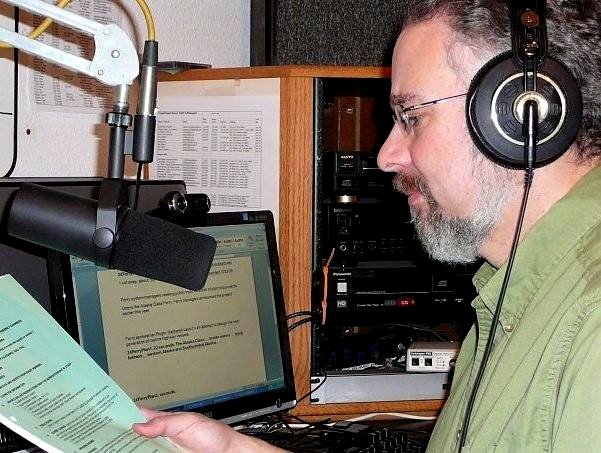
Ed Schoenfeld reads the news at KRBD in Ketchikan. After almost 19 years in print at the Juneau Empire, joining CoastAlaska was a homecoming: Schoenfeld had worked in radio in college, and at KINY and KTOO in Juneau in his early career. (Ed Schoenfeld photo)
KCAW and stations across Alaska will say goodbye to Ed Schoenfeld, whose last day of work was today (Thursday, May 31).
Schoenfeld is retiring after nearly fifteen years as the CoastAlaska regional news director, and almost nineteen years at the Juneau Empire prior to that.
KCAW’s Robert Woolsey caught up with Schoenfeld to get some parting thoughts and wisdom from one of Alaska’s most enduring reporters.
So of course Ed Schoenfeld is working on his last day of work, putting the finishing touches on a story about the likely demise of the fast ferries.
If reporters weren’t so skeptical about almost everything, it would almost be a sentimental moment.
KCAW – You have followed some stories in SE Alaska through the entire arc of their narrative. Weren’t you and I both around back when Tony Knowles unveiled the fast ferries?
Schoenfeld – We certainly were. I remember turning down the option of riding the first fast ferry Fairweather — I think it was from Ketchikan to Juneau — on its maiden shakedown voyage because, well I had too much else to do and I didn’t have money in my budget to go to Ketchikan!
Schoenfeld eventually urged another Southeast reporter to take that ride, setting the pattern for how he would run the regional news desk at CoastAlaska, the five-station consortium including KCAW in Sitka, KTOO in Juneau, KRBD in Ketchikan, KFSK in Petersburg, and KSTK in Wrangell (CoastAlaska has since expanded and will soon include KUCB in Unalaska). Schoenfeld is the uber-collaborator, backfilling our newscasts with regional stories, and sometimes actually filling our chairs when we went on vacation.
“Part of my job is to fill in at local radio stations around Southeast. When I started and didn’t really know the issues as well as I wanted to — and it’s still the case — when I’d go to a town I’d ask people at the station What’s the spot where everyone eats breakfast? Or lunch, or a beer after work. And I would go there and have breakfast, or lunch. And if I could join a conversation I would, but often I would just listen to hear what people were talking about. And it helped me find angles on stories, or whole new story ideas that I’d never have.”
Schoenfeld has helped break in many young journalists, with his “get out of your office” approach to beat reporting. There’s a lot more news in the field than in front of a computer screen, and a lot more hazards.
Like the time he was covering news in Wrangell, and decided to do a feature on the town’s one passionate equestrian, and her animals.
“She said Sure! And she let one of the horses out and led it down to the road (laughs) where people were going by quite fast. And I said, Oh no! Don’t do that! And she said, Oh people in Wrangell are used to this. So the horse kind of ran up and down on the road on its own while I watched the traffic and I watched the traffic and I thought, Oh my god this horse is going to die because I wanted to get the clip-clop sound of its hooves. It was fine.”
Indeed, it was fine.
Schoenfeld says he’ll stop doing news for a while and relax, but he doesn’t think he’ll be out of the business for long, and he’s not sure who owes whom a beer, for all the favors, tips, and collaboration he’s shared with reporters around Alaska in three decades of work. “Don’t you have a spreadsheet?” he asks.






























